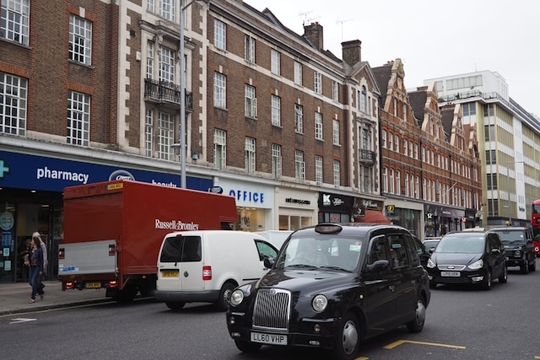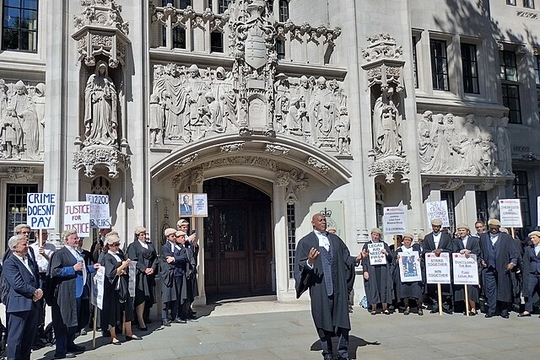A Day in the Life of a High Street Legal Aid Lawyer
by
Oliver Conway
May 12, 2025
Featured in Legal Workers Inquiry (Book)
Will/should high street firms survive

inquiry
A Day in the Life of a High Street Legal Aid Lawyer
by
Oliver Conway
/
May 12, 2025
in
Legal Workers Inquiry
(Book)
Will/should high street firms survive
There seems a general rule that, the more obviously one’s work benefits other people, the less one is likely to be paid for it – David Graeber.1
Introduction / Wake Up
The cat wakes me up at 5am. I bathe and check my emails. I put on an off-the-peg-3-piece suit and try and find an un-stained tie.
I am a 35-year-old family lawyer, and I don’t bother with breakfast. I walk to work on the same streets that I used to walk to primary school, almost 30 years ago.
Watching the band names change on the wheat-pasted posters as I pass. I have come to sympathise with their curling edges.
Our firm was started by a Jewish man fleeing war. He started our firm on the back of conveyances of over 3000 properties from slum landlords to housing associations.
There is still mould on the walls of most of the properties, to this day.
A decade before he began his practice, The Rushcliffe Committee made recommendations which became the basis for the Legal Aid and Advice Bill 1949 brought in by the Attlee government. The report noted;
The great increase in legislation and the growing complexity of modern life have created a situation in which increasing numbers of people must have recourse to professional legal assistance.2
The firm took on working class ‘articled clerks’. My father was one of them, just like Marx I’m the son of a lawyer, but I don’t know if he would recognise my father’s journey from working class child on a council estate to Solicitor in W10 for the feat I have always believed it to be. My father worked for decades to save other people the indignities of his childhood, so I don’t really care what a dead philosopher would have thought about it.
The firm expanded as legal aid services expanded. As the welfare state crumbled under numerous governments chipping away at the essential services the state would fund.
The Ministry of Justice bled repeatedly from cuts because the public would not shed a tear for lawyers, or defendants, or prisoners for that matter. Perhaps partly because of legal aid never being imagined as the 5th pillar of the welfare state, next to NHS, universal housing, state security and universal education.
I often wonder if universal legal aid existed, the people could have held the state in better check. Whether private law could have prevented the ravages of Maggie Thatcher and late capitalism.
The high street law firm / A relic of the 20th Century?
For most of the 20th century, our firm, in accordance with our contract, could resolve your immigration status, assist with your benefits, help with your employment issues, the purchase of your first home, resolve your divorce, sue your builders, sell your house, keep your kid out of prison, and draft your Will.
A one-stop-shop, next to the newsagents for all the issues life and death throws at you.
Over time the firm had to downsize, as there was far less access to Legal Aid allowed by successive governments. Since the delightfully titled Legal Aid, Sentencing and Punishment of Offenders Act 2012, you are now only granted legal aid if you are having your children taken away from you, fleeing with black eyes from people who lie about loving you, or if you are about to lose the roof over your head.
So, our firm became really good at helping those people. We also focused on the high net-worth individuals who could not bear the fees or the blank board rooms of city lawyers.
For 40 years, the firm has helped change the law in the Court of Appeal or House of Lords. Although, The Supreme Court never seems to grant permission these days.
After 7 years of photocopying bundles (staying up until midnight only to find out the pagination is out of sync) taking clients to Public Law Outline meetings where you argue with social workers to get them a new bed for your client’s kids, drafting many documents no one will ever read, and spending hundreds of days in court and evenings in night school. I became a solicitor.
7 years of sleeping on floors or in accommodation I spent two-thirds of my wages to live in.
7 years of watching good people experience bad luck and systems that don’t care crushing them for it.
7 years of trying to stand in the way and change “outcomes” for people. I tried to help other people’s families while drowning in debt and unable to start one of my own.
What Do I Even Do All Day / With Lawyer
I now address High Court Judges on blinking Microsoft Teams links about whether or not my clients should be restrained by those charged with caring for them.
When the receptionist is on break, I still speak to neighbour nuisance new enquiries. I buy the milk and change the printer ink.
My morning client might be a mother of six, addicted to heroin, desperate to get clean and see her babies. My afternoon client might be a CEO desperate to sort out a statutory declaration before he goes skiing.
I can be answering emails about psychological assessments while talking a client down from a bridge on my mobile. Oh, the irony.
All the while, signing the applications my paralegal has prepared. She can speak 4 languages and I hired her because she said she had run the London marathon twice.
Nothing could prepare someone better for legal aid funded work.
My paralegal has a master’s degree and probably earns less than the person who helps me buy my meal deal. I hope she doesn’t mind, as she will be a fantastic Barrister someday.
I regret how little support staff are paid, and how hard they work, to paralegal is to participate centrally and silently (save for the odd email) in a case.
Paralegals are exploited and do not get their names in the law reports. Their role is not a training one, but that is the rub. Eat shit for years without praise and be able to advance in the industry, eventually.
The unspoken contract that you will have a well-paid legal career if you stick it out for low pay in a paralegal role is not the case in legal aid. Your wages will always be capped to what you can bring in. Like all other lawyers we are expected to earn 3 times our wage. Harder to get much of a pay rise on £54 an hour.
Given the number of plates that I must spin in my role, the last-minute hearings and voluminous disclosure a paralegal is essential. I looked up what the word meant once and “With Lawyer” is my favourite description. She is an extra limb, a better brain and she doesn’t take it personally when client’s forget her name.
If it doesn’t pay / why bother doing it?
I can change a life in an afternoon, by being posh sounding, in a dull room full of posh sounding people.
My client, who sits behind me in that same room, cannot read, but she knows that the words on the piece of paper we leave court with is the difference between holding her babies at Christmas or not.
If you can afford me, I am £200+ VAT an hour. If you cannot afford me, I am £54+ VAT an hour, and the state will pay your bill after years of haggling over it.
I take home less of a wage than my school friend, who sets up photo shoots for fashion magazines. However, if I wrote the names of every kid from every family I have helped keep together, it could fill enough of a wall.
You are never lonely when you can help.
Systems are like old TVs and sometimes need a kick to work properly. When I take client’s case on, I get a rush that from my basement office in West London I am squaring up to goliath, in the form of faceless local authority legal email.
Maybe I am a romantic, maybe I have a messiah complex. I think I am just good at it.
Will High Street Firms Survive / Should High Street Firms Survive
The firm is fragile like humans are fragile; it is the sum of its workers. But it is also an idea and ideas can never be crushed easily.
The firm is more than a sign on the high street. It is the letterhead, that told you that your home is yours. The firm is the meeting room where you finally felt safe from him.
The firm is the name the Judge read out before ordering the council to house you.
The firm is the office building you visited, when you never thought you would see your child again.
The high street firm is going the way of the dinosaurs. As Lord Wilson said in 2018;
The UK is dismantling legal aid indirectly by setting rates of renumeration for the lawyers at levels so uncommercial that, reluctantly, most of them feel unable to do that work.3
Our industry is in helping people who don’t have seven years of training to help themselves. We live in an increasingly complex world, and the penalties for any misstep are devastating. Yet our existence depends on the policy decisions of the government that we challenge day after day in court.
It is upsetting that all the goodwill we have from decades in our communities is simply being bought up by corporate entities who can afford to take on our debts and wish to plunder our Will safes.
The Robots Won’t Weep / What Might Replace Us.
They say we will be replaced by chat-bots and automated application software.
I would ask the AI, and indeed Lord Briggs, whether a computer can ever explain to a mother whose learning disability and culture prevent her from understanding what “Adoption” means why she will never see her son again.
Mabe the computers will be better at it, maybe the computer will not be choking back tears after the 4th phone call in as many days. The same hurt confusion making you want to apologise on behalf of the systems that made such a separation a statistical inevitability.
Can the AI explain why the Judge has decided that her son is no longer hers in a way that does not lead her to harm herself or others around her?
Will the AI check in with her and her family in the weeks, months, and years after the case, to ensure she knows when to send the Christmas and Birthday cards?
Her last vestige of contact with a child she carried to full term, nearly died giving birth to, and fought tirelessly for 18 months to care for?
On some days when everything feels rather hopeless, I welcome the robots. Maybe they are better suited to navigating systems, which is what the job of being a legal aid lawyer seems to be. A life coach for poor, broken people through the impossible systems of late-stage capitalism.
What we have is not a direct comparison of workers’ performance or output, but a comparison between the audited representation of that performance and output. Inevitably, a short-circuiting occurs, and work becomes geared towards the generation and massaging of representations rather than to the official goals of the work itself. Indeed, an anthropological study of local government in Britain argues that ‘More effort goes into ensuring that a local authority’s services are represented correctly than goes into actually improving those services’. This reversal of priorities is one of the hallmarks of a system which can be characterized without hyperbole as ‘market Stalinism’.4
The firm may become just another asset on a spreadsheet, the memories of the work it did for people a relic. Just like dinosaurs, the firm may one day be viewed as an impossible thing that, whilst awe inspiring, could not survive such catastrophic political and economic environmental conditions.
The End?
We will be remembered by the people we helped, I am sure, but I wish we could keep existing and keep helping them.
After solving so many people’s problems, it stings that we don’t seem to be able to solve our own.
Legal Aid Lawyers are the mop and bucket of the welfare state. We help clean up the messy lives which results from austerity and the wholesale sell-off of the British state.
Would Marx have seen us as working on behalf of the working class? or would he see us as just another arm of a vampiric state, where there is socialism for capital and plastic fascism for everyone else.
Are we our client’s guide through a world ravaged by an uncaring capitalism?
Does our role simply the grease the wheels of these apathetic systems?
Are we just the scruffy bourgeois, who take comfort in getting to sleep easier than their counterparts in the city earning ten times what we do in an hour, because they are enforcing the will of capital and those in positions of power.
Our firm is a public service that operates privately. Our clients trust the firm because of that private ownership.
Can such a model survive in a period of late-stage capitalism where all businesses are merging into monstrous conglomerates in the service of shareholders?
Will my clients trust a ‘national legal service’, knowing I get a paid by the state, just like the social worker they think is trying to take their kids?
I walk home at 6pm, my head full of a case. I say hello to the charming Albanian interpreter we use, as she gets off the bus.
I go past the luxury flats built where slums used to be. I think about how far away my own home ownership is, but then thoughts of my client’s upcoming appeal and whether we have any cat food left take hold.
I am a legal aid lawyer in a high street firm, but I try every day to do huge things for “little” people and I don’t think I could live any other way.
-
Graeber, David 2013, ‘On the Phenomenon of Bullshit Jobs: A Work Rant’, Strike Mag. ↩
-
Rushcliffe Committee 1945, Report of the Committee on Legal Aid and Legal Advice in England and Wales, Cmd 6641. ↩
-
Bowcott, Owen 2018, ‘Access to justice under threat in UK, says supreme court judge’, The Guardian. ↩
-
Fisher, Mark 2012, Capitalist Realism: Is There No Alternative?, Winchester: Zero Books. ↩
Featured in Legal Workers Inquiry (Book)
author
Oliver Conway
Subscribe to Notes from Below
Subscribe now to Notes from Below, and get our print issues sent to your front door three times a year. For every subscriber, we’re also able to print a load of free copies to hand out in workplaces, neighbourhoods, prisons and picket lines. Can you subscribe now and support us in spreading Marxist ideas in the workplace?
Read next

Introduction to the Legal Workers’ Inquiry
by
Jamie Woodcock,
Tanzil Chowdhury
/
May 12, 2025

